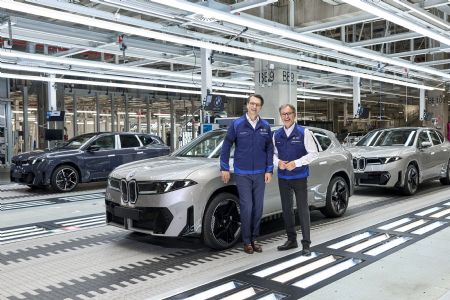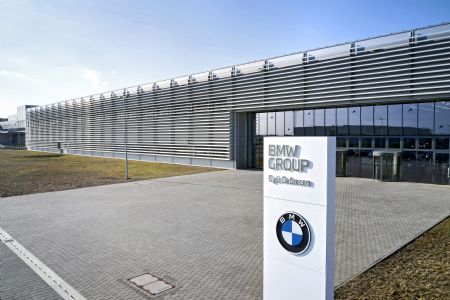 BMW Group
BMW Group is preparing to usher in a new chapter in its manufacturing history as series production of the first Neue Klasse model, the BMW iX3, begins in late October at its newly constructed plant in Debrecen, Hungary. This facility, described as the most innovative in BMW’s global network, has been designed from the ground up to embody the principles of the BMW iFACTORY — a strategic vision for digital, sustainable, and flexible automotive production.
Milan Nedeljković, member of the Board of Management of BMW AG responsible for Production, said: “The start of series production for the BMW iX3 signals a new era of automotive manufacturing. Our new plant in Debrecen has been designed and built fully in line with our strategic vision of the iFACTORY. Digital from the very beginning, the plant will offer a new dimension in efficient production without fossil fuels.”
The Debrecen plant is not only BMW’s first facility built entirely around the iFACTORY concept, but also a showcase of how digital planning and validation can transform industrial operations. Every aspect of the plant — from the layout of the production lines to the positioning of nearly 1,000 robots in the body shop — was simulated and tested in a virtual environment before physical construction began. This digital-first approach culminated in a virtual start of production in March 2023, long before the first physical vehicle was assembled.
Innovative processesHans-Peter Kemser, head of BMW Group Plant Debrecen, said: “We have taken on the challenge of building a completely new vehicle as the first job at an entirely new plant – and doing so in the leanest, most efficient way possible. We have simplified processes, reduced complexity, digitally validated each individual operation and systematically leveraged expertise across our global network. The result is this plant, with its efficient production, innovative processes and the flexibility to integrate additional models.”

The BMW iX3, which will spearhead the Neue Klasse range, is more than just a new electric vehicle (EV). It represents a leap forward in design, technology, and sustainability — the body structure has been engineered to maximise space for the battery, enhancing both performance and range. Design innovations such as the invisible door seal — which creates a seamless visual connection between the window and the door — reflect the integration of aesthetic and functional considerations from the earliest stages of development.
Sustainability is central to the plant’s operations. The paint shop, for example, plays a pivotal role in reducing the carbon footprint of production. BMW estimates that the total CO
2e emissions for producing the iX3 — including in-house parts manufacturing at other facilities such as Landshut — will be around 80kg, a reduction of approximately two-thirds compared to existing BMW models. At full capacity, Plant Debrecen alone will produce vehicles with just 34kg of CO
2e emissions, including the high-voltage battery — a reduction of around 90% compared to other BMW Group plants.
As production ramps up, the BMW iX3 will serve as the launchpad for the Neue Klasse, with its technologies set to be integrated into 40 new models and updates by 2027. Plant Debrecen stands as a testament to what is possible when digital innovation, sustainability, and manufacturing excellence converge — a bold step forward for BMW and the automotive industry at large.
BMW Group’s new plant in Debrecen is redefining what sustainable automotive manufacturing can look like. Traditionally, paint shops have been among the most energy-intensive areas of car production, relying heavily on gas to reach curing temperatures of up to 180°C. At Debrecen, however, BMW has taken a bold step by eliminating fossil fuels entirely from normal operations. The plant will be the first in the Group’s global network to run exclusively on electricity from renewable sources, marking a significant milestone in the company’s decarbonisation strategy.
On-site photovoltaic systemBecause of its high energy demands, the paint shop is the most critical factor in reducing the plant’s overall CO
2e emissions. By switching to renewable electricity, BMW expects to cut annual emissions by up to 12,000 tonnes. A quarter of the plant’s power needs will be met by a 50-hectare on-site photovoltaic system, while surplus solar energy generated during non-working days is stored in a thermal storage system holding 1,800m
3 of water, with a capacity of 130MWh. This stored energy is then used to supply heat during peak demand periods, ensuring consistent energy availability without reverting to fossil fuels.

The paint shop also features an advanced energy recovery system. A heat grid has been integrated into its design, enabling additional energy savings of up to 10%. This system captures waste heat from compressed air systems, drying ovens and cooling units, and repurposes it to pre-heat the water circuit. The result is a highly efficient, closed-loop energy model that supports BMW’s broader sustainability goals.
Digitalisation plays a central role in the plant’s operations. The AIQX (Artificial Intelligence Quality Next) platform, developed in-house by BMW, uses sensors and camera systems along the production line to automate quality control. AI evaluates the data and provides real-time feedback to employees on the line. In future, vehicles themselves will become active participants in the production process, conducting self-analysis and interacting with plant systems and personnel via onboard cameras and IT interfaces.
The plant’s architecture has also been optimised for efficiency. Its “finger structure” layout — an evolution of the design used at BMW Group Plant Leipzig — allows 80% of parts to be delivered directly to the correct point on the assembly line. All-electric logistics are supported by autonomous tugger trains transporting high-voltage batteries and Smart Transport Robots delivering smaller components. By linking all internal and external databases, BMW has achieved a level of digital integration that enables instant analysis and decision-making “at the push of a button”.
Furthermore, Debrecen will also be the first of five BMW plants worldwide to begin series production of the company’s sixth-generation high-voltage batteries. These batteries, developed in-house, benefit from intelligent production processes honed at pilot facilities. AI, data analytics and digital twins are used to optimise workflows and train staff. A zero-defect approach ensures seamless in-line inspections and 100% end-of-line monitoring. In line with the ‘local for local’ principle, high-voltage battery assembly takes place directly on site, allowing the production teams to take advantage of infrastructure efficiencies and short distances.